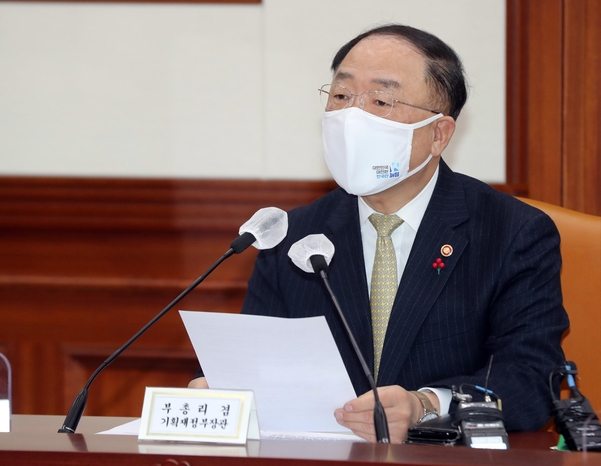Input 2021.01.25 17:10
The Ministry of Information and Concerning the Loss Conservation Act… To avoid the equity controversy, metrics come first.
“Damage support, budget and financial problems… If legalized, the ability to cope with it decreases”
The Ministry of Strategy and Finance was in trouble over the institutionalization of loss compensation for the self-employed, which is the’unvisited road’. This is because, although it has begun to prepare a loss compensation system that is not available abroad, it is not easy to establish a’reference point’ at a level that does not damage financial soundness while adequately compensating for damages to self-employed persons.
The ruling party has already set a policy to pass a special law in February at the extraordinary National Assembly that the state preserves 50-70% of sales compared to the previous year. The ruling party is issuing government bonds for astronomical financing, estimated at tens of trillion won, and is strongly discussing how the Bank of Korea purchases them. However, inside the Ministry of Knowledge Economy, specifying the amount of compensation in the law is a huge burden.

Looking at the required budget, the’Special Bill on Loss Compensation and Win-Win Growth for Overcoming Coronavirus Infectious Diseases’ initiated by Congressman Min is the largest at 24.700 trillion won per month. The’Partial Amendment of the Act on the Protection and Support of Small Business Owners’ initiated by Democratic Party member Kang Hoon-sik is the smallest at 1.2 trillion won per month.
According to a special law promoted by Congressman Min, small business owners who are eligible for compensation are small business owners who suffered economic losses due to COVID-19 such as collective prohibited businesses (up to 70% of lost sales), restricted business (up to 60%), and general business (up to 50%). And small enterprises as a whole.
However, the problem is preparing a reference point for measuring losses. This is because it is difficult to grasp how much small business owners and self-employed people have suffered Corona 19 losses. In a situation where self-employed people are reluctant to expose their income, controversy over equity may arise.
Currently, the government is grasping the decrease in sales of self-employed and small business owners through card sales details or tax report data from the National Tax Service. However, the decrease in sales is not directly related to the damage of Corona 19. For example, sales declined, because some operators have increased their profits as costs have decreased due to Corona 19.
In the end, in order to effectively invest in finances, it is necessary to examine the income one by one to see how much damage was caused by the Corona 19 incident. In addition, even within the same business restrictions and prohibited industries, the difference in sales decline is large, making it difficult to determine the amount of compensation for each support target. It is unclear how accurately self-employed people will be able to determine the decline in sales in an atmosphere of reluctance to expose their income.
The expansion of the simplified taxation of the government’s VAT also makes it difficult to calculate accurate income. For small business owners and self-employed people suffering from Corona 19, the government exempted VAT payments from businesses with annual sales of less than 48 million won last year. From this year, simple taxation is applied up to 80,000 won based on annual sales.
Under the current law, simple taxation business operators do not have to submit to the government data on the basis of tax calculations (tax invoices) indicating when and to whom and how much goods or services, even after supplying goods or services. This can make it difficult for the tax statistics to confirm the decline in sales.
Political circles are speeding up the legislation of self-employed loss compensation, but observations are raised that it will take time for the Ministry of Information and Infrastructure to come up with a specific plan. Some say that the Ministry of Knowledge Economy will push forward a plan to put provisions in the existing laws, such as the Act on Prevention and Management of Infectious Diseases, and establish an enforcement ordinance by the government rather than establishing a special law for compensation of loss.
An official of the Ministry of Science and Technology said, “We are comprehensively reviewing various measures without limiting compensation targets or standards.”
Experts also agree with the need to legislate the basis for damage compensation according to the infectious disease response policy, but advised that detailed standards such as compensation amount should be determined flexibly.
Seong Tae-yoon, a professor of economics at Yonsei University, said, “It is understandable enough to support the self-employed and small business owners suffering from Corona 19. However, it is not a matter of budget and finance because we did not have the law. “Because it has to be carried out in accordance with the law, the coping ability may be lowered. It seems more urgent to create a sophisticated income reduction algorithm that can provide accurate screening support,” he said.
